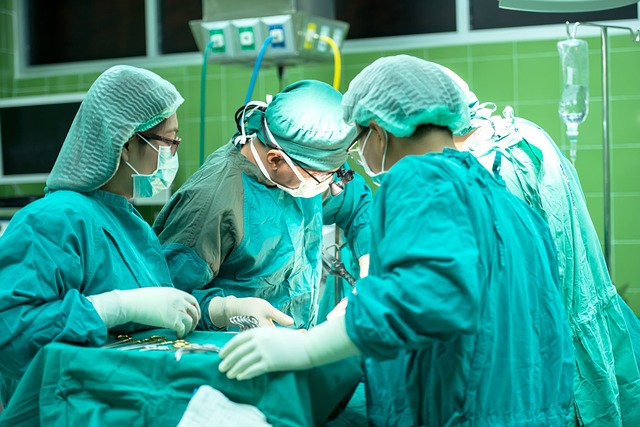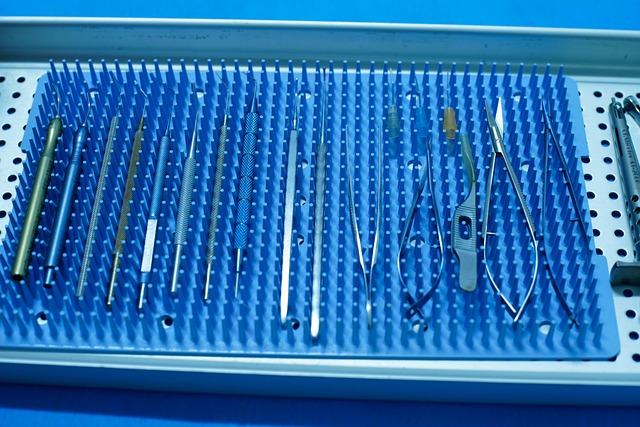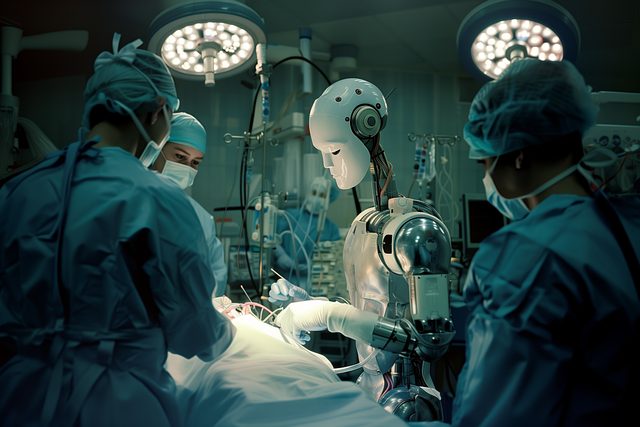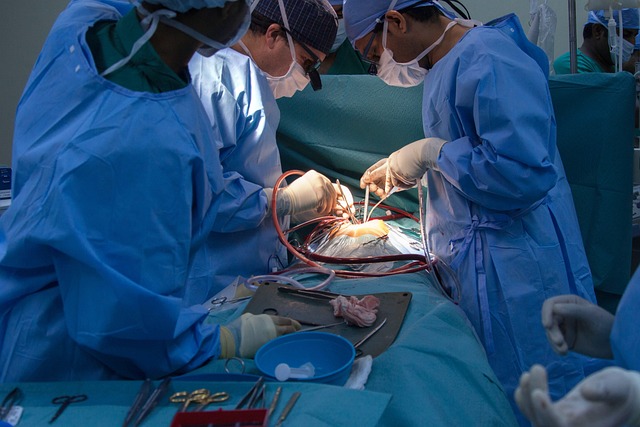Regenerative post-surgery treatments have become a transformative aspect of post-operative care, significantly enhancing the healing process following surgical interventions. These innovative therapies harness the body's natural regenerative abilities through advanced techniques like platelet-rich plasma (PRP) injections and stem cell therapy, which are tailored to individual patient needs for effective recovery support. By integrating these with traditional physical therapy, they offer a holistic approach that aims to minimize scar tissue, alleviate pain, and shorten rehabilitation time. These non-invasive post-op treatments represent the forefront of surgery recovery solutions, promising benefits such as improved quality of life, faster recovery, and better surgical outcomes by leveraging regenerative recovery support and tissue repair therapy. The evolution of post-operative care now includes these cutting-edge healing therapies that personalize treatment for each patient, facilitating a more comprehensive and efficient return to normal activities after surgery.
Regenerative therapies are revolutionizing post-operative care, offering innovative approaches for enhanced recovery after surgery. This article delves into the mechanisms of tissue repair and examines how these cutting-edge healing therapies can significantly improve surgery recovery solutions. We explore a spectrum of non-invasive post-op treatments that are reshaping rehabilitation and recovery, providing insights into the multifaceted strategies that promote effective tissue regeneration following surgical interventions. Join us as we uncover the transformative potential of regenerative therapies in the realm of post-surgery treatments and their impact on recovery outcomes.
- Understanding Tissue Repair and the Role of Regenerative Therapies in Post-Operative Care
- Exploring Advanced Healing Therapy Options for Enhanced Recovery After Surgery
- The Impact of Regenerative Recovery Support on Surgery Recovery Solutions
- Non-Invasive Post-Op Treatments: A Closer Look at Regenerative Therapies in Rehabilitation and Recovery
- Embracing a Multifaceted Approach to Promote Effective Tissue Repair Following Surgery
Understanding Tissue Repair and the Role of Regenerative Therapies in Post-Operative Care

Regenerative therapies have emerged as a transformative component in post-operative care, offering innovative solutions for those undergoing surgery and seeking optimal recovery outcomes. The healing process following surgical interventions can be significantly accelerated by these treatments, which harness the body’s innate regenerative capabilities. For instance, platelet-rich plasma (PRP) injections and stem cell therapies are non-invasive post-op treatments that support tissue repair therapy, facilitating recovery after surgery by promoting cellular growth and tissue remodeling. These advanced healing therapy options are tailored to the patient’s specific needs, ensuring regenerative recovery support that is both effective and personalized.
In the realm of rehabilitation and recovery, the focus has shifted towards integrating regenerative post-surgery treatments to enhance the natural repair mechanisms of the body. Post-operative care strategies now often include a combination of traditional physical therapy and cutting-edge regenerative medicine techniques. This holistic approach to surgery recovery solutions not only expedites the healing process but also potentially improves the overall quality of life for patients by minimizing scar tissue, reducing pain, and shortening the duration of rehabilitation. As such, these therapies are becoming increasingly essential in the post-operative care continuum, offering a promising outlook for those recovering from surgery.
Exploring Advanced Healing Therapy Options for Enhanced Recovery After Surgery

Post-operative care has evolved significantly with the advent of regenerative post-surgery treatments that promise enhanced recovery after surgery. These innovative therapies are designed to facilitate healing therapy at a cellular level, supporting regenerative recovery support in patients undergoing various surgical procedures. One such solution is the use of platelet-rich plasma (PRP) injections, which harness the patient’s own blood components to accelerate tissue repair therapy. This non-invasive post-op treatment not only aids in the natural healing process but also minimizes the potential for scarring and adverse reactions common with traditional methods. Furthermore, stem cell therapies have emerged as a beacon of hope in the realm of surgery recovery solutions, offering a potent approach to rehabilitation and recovery by promoting the regeneration of damaged tissues and organs, thereby enhancing overall post-surgical outcomes. These advanced options are revolutionizing the way patients heal after surgery, promising not only a faster return to normal activities but also improved long-term prognosis for various conditions.
The Impact of Regenerative Recovery Support on Surgery Recovery Solutions

In the realm of surgical interventions, the evolution of post-operative care has been marked by a shift towards regenerative post-surgery treatments that promise to enhance recovery after surgery. These innovative therapies are pivotal in facilitating healing therapy and promoting efficient tissue repair therapy. Unlike traditional post-op care, regenerative recovery support employs non-invasive methods such as stem cell therapy and platelet-rich plasma injections. These approaches not only accelerate the natural healing process but also offer a potential to reduce the reliance on invasive procedures and pharmaceuticals during rehabilitation and recovery. The integration of these technologies into surgery recovery solutions has shown promise in minimizing downtime, thereby allowing patients to resume their daily activities sooner with improved outcomes.
Furthermore, regenerative recovery support is becoming a cornerstone in the arsenal of surgery recovery solutions due to its minimal side effects and tailored approach to each patient’s unique healing dynamics. By leveraging a patient’s own biological processes, these treatments not only address the immediate concerns following surgery but also aim to prevent potential complications that can arise during the rehabilitation phase. This holistic strategy is set to revolutionize post-operative care, offering patients a more effective and less traumatic path towards full recovery. The implications of such advancements are profound, with the potential to transform the outcomes for a wide array of surgical procedures by harnessing the body’s innate capacity for repair and regeneration.
Non-Invasive Post-Op Treatments: A Closer Look at Regenerative Therapies in Rehabilitation and Recovery

Regenerative therapies have emerged as a transformative aspect of post-operative care, offering innovative solutions for recovery after surgery. These advanced treatments, which include cell-based therapies and tissue engineering, are designed to support regenerative post-surgery treatments by enhancing the body’s natural healing abilities without the need for extensive interventions. For patients undergoing orthopedic or soft tissue surgeries, these non-invasive post-op treatments can significantly accelerate the healing process, leading to a quicker and more efficient recovery. The goal of these therapies is to facilitate tissue repair therapy in a manner that optimizes rehabilitation and recovery support, allowing individuals to return to their pre-injury status or even surpass it.
In the realm of surgery recovery solutions, regenerative medicine has become integral, offering personalized approaches tailored to each patient’s unique needs. These treatments involve the use of growth factors, stem cells, and platelet-rich plasma (PRP) to stimulate cellular repair mechanisms. This approach not only reduces the reliance on traditional pain medication but also minimizes the risk of complications associated with invasive procedures. As a result, patients benefit from a more holistic recovery experience that combines clinical efficacy with minimal discomfort and shorter hospital stays, thereby improving their overall quality of life during the rehabilitation process.
Embracing a Multifaceted Approach to Promote Effective Tissue Repair Following Surgery

Post-operative care has evolved significantly with the advent of regenerative post-surgery treatments, which aim to enhance recovery after surgery. These innovative healing therapies provide a foundation for regenerative post-op treatment that supports tissue repair therapy more effectively than traditional methods. By leveraging advanced biomaterials and cell-based interventions, these treatments facilitate a controlled environment for cell growth and tissue reconstruction, leading to faster and more robust recovery. This multifaceted approach to promoting effective tissue repair following surgery not only includes the use of growth factors and stem cells but also incorporates non-invasive techniques that minimize scar formation and maximize functional restoration.
Rehabilitation and recovery post-surgery are no longer confined to passive recovery strategies; instead, they are supported by a spectrum of regenerative recovery support solutions. These interventions are tailored to the individual patient’s needs, ensuring personalized surgery recovery solutions that accelerate the healing process. The integration of these therapies into standard post-operative care protocols has demonstrated significant potential in improving surgical outcomes, with patients experiencing reduced recovery times and a lower likelihood of complications. As such, the focus on regenerative medicine in the context of post-operative care is set to redefine how we approach surgery recovery, promising a future where recovery after surgery is not only faster but also more complete.
Regenerative therapies stand at the forefront of post-operative care, offering innovative avenues for enhanced recovery after surgery. These treatments, which encompass a range of healing therapies, provide surgery recovery solutions that are both effective and non-invasive. By supporting regenerative recovery support, patients can experience accelerated tissue repair, significantly improving their rehabilitation and recovery trajectory. As the medical community continues to explore these advanced options, it is clear that a multifaceted approach to promoting effective tissue repair following surgery is not only promising but also pivotal in the realm of post-operative care. These therapies hold the potential to transform the landscape of recovery after surgery and offer hope for those seeking less aggressive means to heal.
